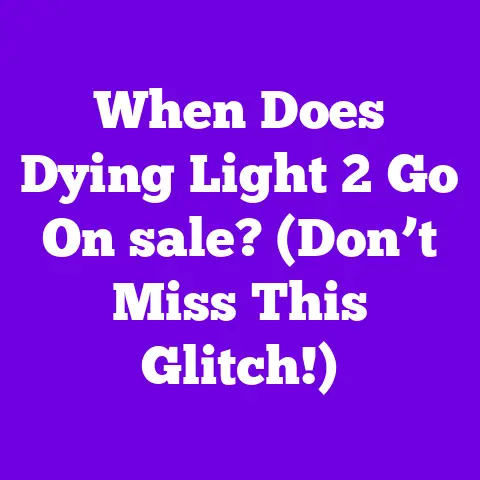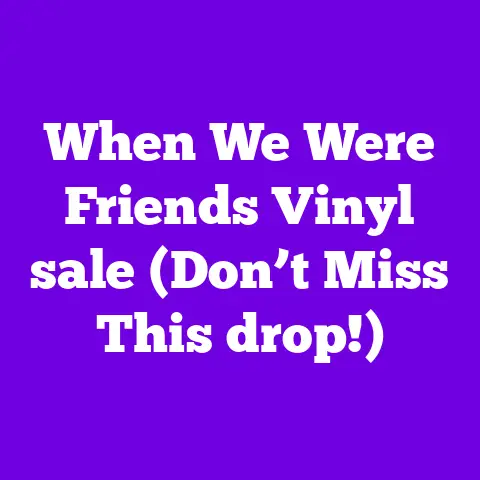When Does Nintendo eShop Have sales? (Hurry, Games Are Cheap!)
As a dedicated gamer, there’s nothing quite like the thrill of scoring a fantastic deal on a beloved title.
With the Nintendo Switch’s immense popularity and extensive library, the eShop serves as a treasure trove for gamers seeking to expand their collections without breaking the bank.
In this article, I will take you on a journey through the sales patterns of the Nintendo eShop, highlighting when you can snag incredible discounts on your favorite titles.
Whether you’re a seasoned Switch owner, a parent eager to find affordable games for your children, or a newcomer navigating the vibrant world of Nintendo, understanding these sales can help you maximize your savings.
So, let’s dive in and explore the ins and outs of when to catch the best sales on the Nintendo eShop!
Overview of the Nintendo eShop
The Nintendo eShop was launched in 2012, initially serving as a digital storefront for the Nintendo 3DS.
Over the years, it has evolved into a crucial component of the Nintendo ecosystem, particularly with the release of the Nintendo Switch in 2017.
The eShop allows users to purchase and download games directly to their consoles, making it a convenient option for gamers on the go.
One of the most appealing aspects of the eShop is the vast array of games available, which ranges from blockbuster titles to indie gems.
Whether you’re into action-adventure games, RPGs, or puzzle titles, the eShop has something for everyone.
Moreover, buying digitally means you can access your games anytime without the clutter of physical cartridges.
The eShop’s user-friendly interface allows gamers to browse by categories, search for specific titles, and view top-selling games.
Additionally, it features regular updates on new releases and a section dedicated to ongoing sales, making it easy for users to find the best deals.
Understanding Nintendo’s Sales Patterns
To truly take advantage of the Nintendo eShop sales, it’s vital to understand their patterns.
Over the years, I’ve noticed several seasonal sales events that gamers can rely on to save money.
Seasonal Sales Events
Black Friday Sales: This is one of the most significant sale events in the gaming calendar.
Typically starting the day after Thanksgiving in the United States, these sales can last through Cyber Monday.
During this period, many popular titles see significant discounts, often up to 50% off.Summer Sale: Usually occurring in late June to early July, the Summer Sale is another crucial time for gamers to find discounts.
This sale often includes a wide variety of games, from indie titles to major releases.Holiday Sale: The Holiday Sale generally kicks off in mid-December and runs into early January.
With many people shopping for gifts or spending their holiday money, this sale features a plethora of discounted games, making it one of the best times to buy.
Regular Sales Events
In addition to the seasonal sales, Nintendo frequently holds regular sales that can be just as beneficial.
Weekend deals often pop up, providing discounts on selected titles for a limited time.
There are also publisher-specific sales that highlight games from particular developers or franchises.
For example, a Nintendo Direct may announce a sale on all Mario games, prompting fans to act quickly.
Indie game promotions are another staple of the eShop sales calendar.
I’ve found that many indie developers use the platform to offer discounts, especially during events such as the Indie World Showcase.
These sales can sometimes feature games at up to 80% off, making them an excellent opportunity for gamers to explore new titles.
Patterns in Game Discounts
It’s also interesting to observe patterns related to new releases.
Typically, newly launched games are less likely to go on sale immediately.
However, after a few months, I’ve noticed that many titles, especially those that may not have performed as well, often see significant discounts.
This trend encourages gamers to wait a bit longer for a price drop, particularly for games that may not be instant classics.
January
January often sees post-holiday sales as retailers clear out inventory, and the eShop follows suit.
Discounts can range from 20% to 50% off on various titles.
February
February is generally quieter on the sales front but can include promotions for Valentine’s Day, with games that feature romance or cooperative gameplay often discounted.
March
March brings the Nintendo Direct announcements, and often coincides with spring sales.
Look out for discounts on popular franchises like Pokémon or Zelda.
April
April usually has a few weekend sales, often featuring indie games.
It’s a great month to explore lesser-known titles at reduced prices.
May
May tends to ramp up with sales leading into E3.
Nintendo often uses this time to showcase upcoming titles and clear out older inventory with discounts.
June
As mentioned earlier, the Summer Sale kicks off in late June, providing a wealth of discounts.
This is the time to stock up on games for summer gaming sessions.
July
July often sees a continuation of summer sales, with specific indie game promotions frequently featured.
August
August is typically a quieter month, but there may be some back-to-school promotions, especially for family-friendly titles.
September
With the arrival of fall, September brings new releases and some discounts on older games that are often bundled together.
October
October can be exciting for Halloween-themed discounts.
Look for games with horror elements or spooky themes, often discounted around this time.
November
November is dominated by Black Friday sales.
Expect massive discounts and bundles, making it one of the best months for gamers.
December
The Holiday Sale in December is one of the biggest events of the year, with discounts on a massive selection of games to entice gift-givers and last-minute shoppers.
Tips for Finding the Best Deals
As you navigate the Nintendo eShop, there are several strategies you can employ to ensure you’re getting the best deals possible:
Stay Informed
Subscribing to the Nintendo newsletter can keep you updated on upcoming sales and promotions.
Additionally, following Nintendo on social media platforms, such as Twitter or Instagram, can provide real-time updates on flash sales and discounts.
Wish Lists and Price Tracking
Utilizing the eShop’s wish list feature is a great way to monitor your favorite titles.
You can add games you’re interested in and receive notifications when they go on sale.
Additionally, there are several third-party price tracking tools and websites that can notify you when a game drops in price.
Timing Your Purchases
Understanding when sales typically occur can help you time your purchases more effectively.
For instance, if you know that a particular game often goes on sale during the summer or holiday sales, it might be worth waiting rather than buying at full price.
Highlighting Popular Game Sales
Many popular Nintendo games frequently see discounts during sales events.
Here’s a selection of some fan favorites and the potential savings you can find:
- The Legend of Zelda: Breath of the Wild
- Original Price: $59.99
-
Sale Price: $41.99 (30% off during summer sales)
-
Super Mario Odyssey
- Original Price: $59.99
-
Sale Price: $39.99 (33% off during Black Friday sales)
-
Splatoon 2
- Original Price: $59.99
-
Sale Price: $29.99 (50% off during holiday sales)
-
Fire Emblem: Three Houses
- Original Price: $59.99
-
Sale Price: $44.99 (25% off during spring sales)
-
Hollow Knight
- Original Price: $14.99
- Sale Price: $7.49 (50% off during indie promotions)
These examples illustrate the kind of savings that can be found during various sales events, making it easier to build an impressive game library without overspending.
The Impact of Sales on Game Selection
Sales events have a profound impact on consumer behavior.
As a gamer, I often find myself drawn to discounted titles that I may not have considered at full price.
This phenomenon can lead to impulse buying, where the allure of a bargain encourages gamers to purchase a game simply because it’s on sale.
Impulse Buying and Game Discovery
The excitement of a sale can lead to discovering new games.
I’ve often stumbled upon hidden gems during sales that I wouldn’t have looked at otherwise.
Discounts can also prompt gamers to take risks on titles outside of their usual genres, broadening their gaming experience.
Conclusion
As we’ve explored throughout this article, the Nintendo eShop is a treasure trove of discounts just waiting to be uncovered.
With seasonal sales, regular promotions, and strategic timing, gamers can maximize their savings while expanding their game collections.
From understanding the sales patterns to employing practical tips and tricks, being proactive can make a significant difference in your gaming wallet.
I encourage you to stay engaged with the eShop, keep an eye on announcements, and utilize tools like wish lists and price trackers to ensure you don’t miss out on those coveted deals.
Happy gaming, and may your eShop adventures be filled with fantastic savings!






